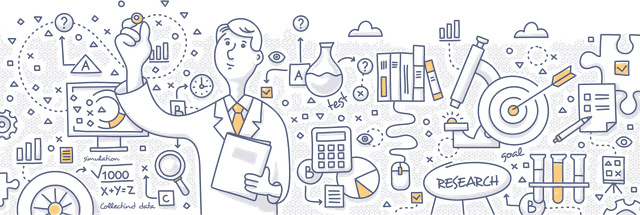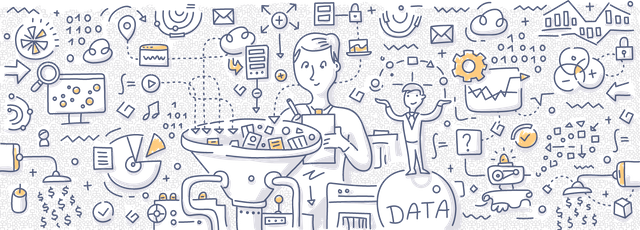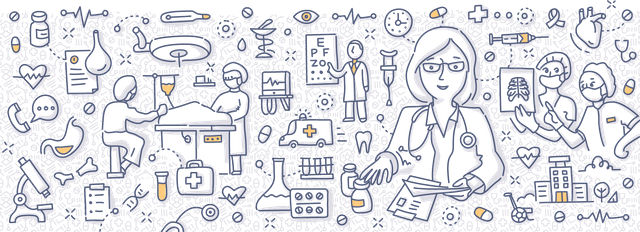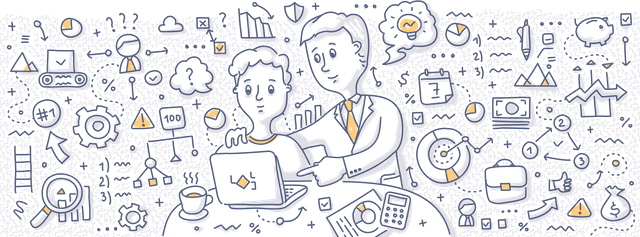
Have you recently been to a doctor and gotten a chance to take a look at one of their computer screens? If so, you most likely would have noticed that the software looks somewhat different from the apps that you are using on a daily basis. One might say that the software solutions of most care providers seem outdated- which unfortunately is indeed very common amongst all kinds of medical practices [3, 5].
Another question you may have asked yourself is why healthcare nowadays still involves such a high amount of talking to different doctors in person, having to visit them at different locations and exchanging physical media- to the point of holistic care seeming like wishful thinking.
The reason for these circumstances lies in all your health-related information being scattered across a myriad of platforms and devices [2, 4]. Because of this, data access and aggregation are not only very costly [6]- they also raise security and trust issues while significantly lowering the quality of therapies. Medical errors, extensive monetary losses, fraud, and corruption are an everyday reality [1, 3, 7].
Ultimately, the inaccessibility of health-related data greatly hinders medical research, thus preventing the necessary steps to advance human health [2, 6].
The healthbase project

At the moment there are several projects in place that tackle a subset of the above-mentioned problems. This approach fixes certain shortcomings of the system for certain parties involved. However, there seems to be no comprehensive approach to revamp the system with all of its deficiencies for all participants. The main reason for this probably lies in the daunting nature of the status quo: A plethora of healthcare systems in combination with political and social obstacles certainly make the implementation of fundamental changes a quite ambitious task. Luckily history has shown that ambitious tasks are merely difficult challenges that people overcome to produce the most desirable outcomes.
The healthbase project started back in 2015 with the goal to develop a compelling software solution for medical practices as well as patients. Contemporary technology in addition to the aggregation of all health-related data for the first time should allow for extensively better healthcare.
The software has since been tested in two German medical care centers and gotten positive reviews- but challenges regarding security, privacy, and trust remained. In 2017, the healthbase team then stumbled across blockchain technology. Having evolved from its first financial application, this technology suddenly offered a tangible way to overcome those challenges. Soon the decision to reach out to the Blockchain Center of the Frankfurt School of Finance and Management was made, to acquire expert knowledge on the matter. The result was a fruitful partnership that gave birth to a convincing new concept.
Disrupting medical research

The new healthbase concept aims to revolutionize both healthcare and medical research by utilizing modern information technology and the blockchain. In detail this is achieved through the execution of a three-step process:The first step is to gather and store all the health-related information of an individual securely while ensuring privacy. This is done by providing care providers and patients with connected, blockchain-empowered applications to access and manage the health data.
After that, the information is meaningfully aggregated for their target use cases in healthcare and research.
Lastly, convenient and secure data access is made possible through the applications. Access rights are governed by the individual and can be shared with care providers, as well as sold anonymized to researchers. Apart from the payments going to the individual and the care provider, a portion of the money goes to healthbase, thus creating automated monetization.
As a result, high-quality health data can be used to improve research, diagnoses, and therapies like never before.
Benefits for everybody

So what are the exact benefits for everyone using the healthbase applications? Taking on the different perspectives answers that question in an easily understandable way:
From a patient’s or rather individual’s perspective
....I have all my health-related data at the touch of my fingertips inside the healthbase smartphone app
.…I can share all my health-related data with my care providers to facilitate better therapies
.…I can sell my anonymized data to researchers to get money or services in return.<br>
As a care provider
….I get secure and easy access to my patient’s health data, including the data that other providers collected
.…I get state of the art, free of charge software to manage my practice and more efficiently
.…I earn money every time one of my patient’s anonymized data is sold to a researcher
.…I get easy access to medical studies.<br>
As a researcher
….I get easy access to high-quality health data and medical studies while saving money
.…I can earn money by selling studies to other researchers over the healthbase platform.
What’s next

healthbase is the opportunity to leverage blockchain and modern information technology for the purpose of reaching the next level in healthcare and medical research. Granting that this goal is not exactly easily attainable, it still is more than worth the effort and far from unrealistic. The project already made a lot of progress and continues to inspire competent and enthusiastic partners- which makes us very grateful, and we want to express our deep gratitude for all the support so far. One of the good things about healthbase is that virtually anybody can relate to the cause and help make it happen.
To push forward and truly be able to handle the global scope of the project, an ICO is being prepared to launch in 2018. Besides further refining the concept details this primarily involves spreading the word and inspiring more people to join the movement. This is where you come in- why not join our community via one of our channels and at the least stay updated? We would definitely love to hear from you!
Stay updated about healthbase by following us on the below channels:
1. Facebook — www.facebook.com/healthbase.digital
2. Twitter — www.twitter.com/healthbase1
3. Slack — https://join.slack.com/t/healthbase/shared_invite/enQtMjQ2Njg5OTE3MjM4LTJlZjNmMTZjMmNlZDg0MWFkNTQ2MDA1MTg1OTU1ZGQwMWZhODhjOWZmOGVkMDk2NTMzYjAxZjVhZGJiZWRmMDI
4. Telegram — https://t.me/joinchat/Fsvr7g48R1utm-ajn0jaTw
5. Linkedin - https://www.linkedin.com/company/healthbase-digital
References
1. David W. Bates, MD, MSC, Michael Cohen, MS, RPH, Lucian L. Leape, MD, J. Marc Overhage, MD, PHD, M. Michael Shabot, MD, Thomas Sheridan, S. (2001). Reducing the Frequency of Errors in Medicine Using Information Technology. Information Development, 22(2). https://doi.org/10.1177/0266666906065548
2. Ekblaw, A., Azaria, A., Halamka, J. D., Lippman, A., Original, I., & Vieira, T. (2016). A Case Study for Blockchain in Healthcare: “ MedRec ” prototype for electronic health records and medical research data 2: Using Blockchain for Medical Data Access and Permission Management. Retrieved from https://www.healthit.gov/sites/default/files/5-56-onc_blockchainchallenge_mitwhitep aper.pdf
3. IBM. (2016). Blockchain: The Chain of Trust and its Potential to Transform Healthcare – Our Point of View. NIST Workshop on Blockchain & Healthcare.
4. Yue, X., Wang, H., Jin, D., Li, M., & Jiang, W. (2016). Healthcare Data Gateways: Found Healthcare Intelligence on Blockchain with Novel Privacy Risk Control. Journal of Medical Systems. https://doi.org/10.1007/s10916-016-0574-6
5. Kellermann, A. L., & Jones, S. S. (2013). What it will take to achieve the as-yet-unfulfilled promises of health information technology. Health Affairs, 32(1). https://doi.org/10.1377/hlthaff.2012.0693
6. Mcfarlane, C., Beer, M., Brown, J., & Prendergast, N. (2017). Patientory - Whitepaper, (May).
7. Pham, J. C., Aswani, M. S., Rosen, M., Lee, H., Huddle, M., Weeks, K., & Pronovost, P. J. (2012). Reducing Medical Errors and Adverse Events. Annual Review of Medicine, 63(JANUARY), 447-463. https://doi.org/10.1146/annurev-med-061410-121352